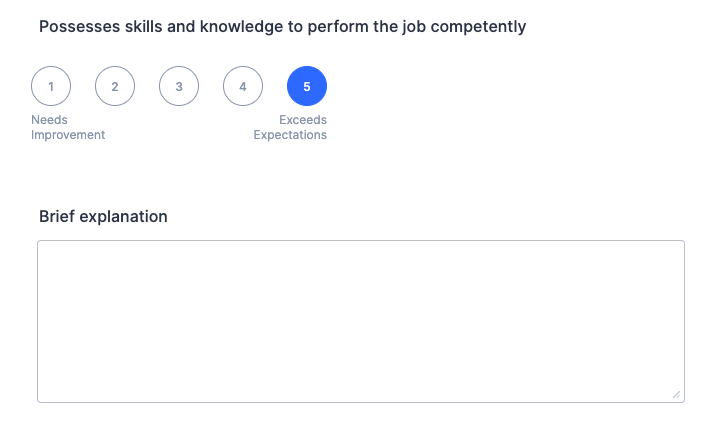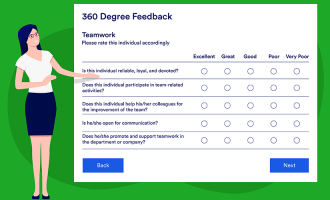Your employees are the lifeblood of your company. From day-to-day operations to your corporate culture, selecting and maintaining the right workforce can make or break your business.
Understanding and evaluating strengths and weaknesses is essential to keeping your team motivated and your company efficient. The easiest way to monitor these qualities is through effective employee evaluations.
Filling out an employee form as you evaluate each employee provides a permanent record for both you and them. You can make the form as detailed or as open-ended as you want, depending on how much feedback you want to gather, but there are two essential topics you should cover in an employee evaluation form or performance appraisal: strengths and weaknesses.
Conduct employee evaluations on any device with Jotform’s employee performance review form template!
What are employee strengths and weaknesses?
Every employee is different. They all have varying work styles, attitudes, and strengths and weaknesses. But what do strengths and weaknesses in the workplace look like? What you consider to be a strength may depend on your industry, but there are certain universal strengths and weaknesses that are important to keep in mind when evaluating your workforce.
Employee strengths are qualities that add to the overall effectiveness of their performance. They add value to your organization, whether that be through their work or overall impact on company culture.
Weaknesses do the opposite. An unaddressed weakness can lead to sub-par work, unhappy employees, or even a drop in productivity. This makes it all the more vital to address employee weaknesses (and encourage their strengths) early to prevent any potential damage.
Here are some common employee strengths and weaknesses to keep an eye out for during your evaluations.
Pro-Tip
Create employee evaluation forms for your company without any coding and fill them out on any device.
Examples of employee strengths
Some common employee strengths include
- Creativity
- Adaptability
- Varied skills
- Focus
- Self-starting attitude
- Transparency
- Willingness to learn
- Receptiveness to feedback
- Motivation
- Commitment
Examples of employee weaknesses
Some common employee weaknesses include
- Lack of confidence
- Being critical of others
- Aversion to feedback
- Stubbornness
- Passiveness
- Procrastination
- Over-sensitivity
- Disorganization
- Self-serving attitude
Common criteria for employee performance appraisals
Giving employees positive feedback is one of the best ways to keep them engaged (and employee engagement is a top challenge identified by HR professionals). But it’s not enough to simply praise an employee for doing a good job. Delivering honest, constructive feedback motivates employees, reinforces positive behavior, and boosts employee confidence.
Including strengths and weaknesses in performance appraisals shows employees you notice and appreciate their contributions. Elaborating on their strengths as well as identifying specific areas where they can improve helps them evaluate their own performance and understand how to move forward.
Here are six of the most common employee criteria to evaluate in a performance appraisal.
Teamwork
Working effectively with clients, managers, and coworkers is crucial for a cohesive and enjoyable work environment. Working alongside others, no matter the industry, is how we achieve goals, find creative solutions to problems, and change organizations for the better. On the other hand, not working well with others affects team morale and makes it difficult for coworkers to collaborate and solve problems.
Evaluating employees’ teamwork skills helps you gauge each individual’s contribution and determine if they are meeting their responsibilities. Measuring this skill regularly ensures employees are living up to the standards you set for them.
Adaptability
Your employees need to perform their jobs successfully in a rapidly changing environment. The ability to handle change and embrace new procedures are indispensable skills for employees to have — especially during a crisis.
Evaluating adaptability is crucial in determining whether an employee will embrace new technology, responsibilities, and ever-changing customer needs to align with an evolving company culture. Those who are rigid and resistant to change undermine productivity and lower morale.
Interpersonal skills
Employee harmony is important, but not all employees interact in the same ways. The ability to relate to peers, managers, and direct reports is an important skill to evaluate when reviewing strengths and weaknesses in performance appraisals.
Everyone on your team needs to foster strong working relationships with coworkers, clients, and vendors. These characteristics help create the positive work environment teams need to be productive. Plus, evaluating an employee’s interpersonal skills will help you determine what tasks to assign them.
Job knowledge
Evaluating each employee for the knowledge, expertise, and skills pertinent to their job deepens your insight into that person’s strengths and the training they need to be a well-rounded teammate. A typical analysis will include knowledge of facts, rules, and procedures, as well as what the job requires and how to do it.
Evaluating these skills helps you identify who the best performers are so you can reward them accordingly. Finally, evaluating job knowledge can help you gauge employee leadership capabilities. This is how you make sure you have the right person in the right position and optimize your talent to minimize your organization’s weaknesses.
Attention to detail
When an employee shows strong attention to detail, they’re completing tasks thoroughly and accurately. They help the entire organization avoid mistakes — like ordering too much product or paying a supplier late.
Reviewing employees for these traits is crucial, as mistakes can be costly. Be sure to praise employees who are organized and double-check their work to encourage others to do the same.
Pro-Tip
Sign up for a free Jotform account to create powerful online forms in minutes — with no coding required.
Communication
Communication is essential to presenting and understanding information quickly and accurately. Strong communicators can express themselves effectively in both the written and spoken word. They make clear statements, actively listen to others, and incorporate their peers’ feedback.
Poor communication skills often lead to costly misunderstandings and lost time and money. When evaluating this skill, take into account how an employee communicates verbally, visually, nonverbally, and in writing. Employees who communicate effectively help build a more positive and effective work environment.
There are several performance appraisal strengths and weaknesses that companies can — and should — evaluate in their employees. Being able to identify and praise strengths, as well as correct weaknesses, can make all the difference in your company’s well-being. By consistently evaluating employee performance, you can vastly improve both performance and company morale.


















































































Send Comment:
1 Comments:
More than a year ago
Informative blog. It will help the employer to know about their employee's weakness and strength. by this the company will improve their growth.